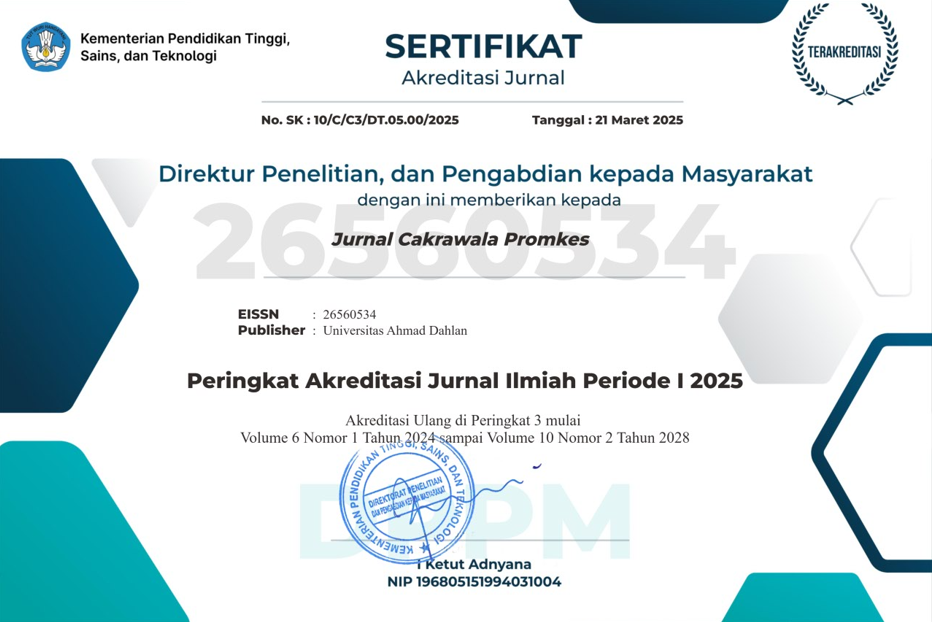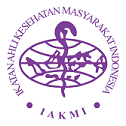Hubungan keterlibatan ayah dalam pengasuhan dengan kecerdasan emosional remaja
DOI:
https://doi.org/10.12928/promkes.v3i1.2875Keywords:
Emotional intelligence, Father's involvement, Parenting, Adolescents.Abstract
Indonesia has a demographic bonus where the number of young people is quite large than the old generation and children. Youth in Pekanbaru City reached 20,095% or 234.916 people. The problem is from the preliminary studies results that many adolescents have low emotional intelligence because they are considered less skilled in socializing and are motivated because of social media and electronic media. This study aims to determine the relationship between father involvement in parenting with adolescent emotional intelligence. This research is a quantitative study with a cross-sectional design. The sample in this study were 116 adolescents of Air Cold Village, Bukit Raya Pekanbaru District. Sampling using the Non-Probability technique with the snowball sampling method. Researchers used a questionnaire to collect data. This study uses a bivariate analysis, namely Chi-Square. The results showed that fathers' involvement in parenting was in the high category, namely 92.2% of 107 people. Kidney intelligence is in the percentage of 82.8% of 96 people. Thus, there is a positive or significant relationship between fathers' involvement in parenting and adolescent emotional intelligence with a value of P = 0.008 (p <0.05). With these results, it is hoped that nurses can motivate nurses to promote health-related to adolescent psychology through the Youth Family Development Program and the Youth Care Health Program. This is important as an effort to foster adolescent emotional intelligence.Â
Â
Keywords: Emotional Intelligence, Father’s involvement, Parenting, Adolescents  Â
References
2. Statistik BP. Statistik Indonesia 2019. Jakarta: BPS; 2019.
3. Badan Pusat Statistik. Kota pekanbaru dalam angka Pekanbaru municipality in figures 2019. Pekanbaru: BPS; 2019.
4. Saam, Z., & Wahyuni S. Psikologi keperawatan. Jakarta: Rajawali Pers; 2014. 56–71 p.
5. Ali, M., & Asrori M. Psikologi remaja perkembangan peserta didik. Jakarta: PT Bumi Aksara.; 2012. 9–75 p.
6. Tirtayani, L. A., Asril, N. M., & Wirya N. Perkembangan sosial emosional pada anak. Yogyakarta: Graha ilmu; 2014.
7. Purba R, Harahap KNP. Hubungan Fungsi Afektif Keluarga Dengan Kecerdasan Emosional Remaja Di Sma Negeri 1 Kecamatan Panai Hulu Kabupaten Labuhan Batu Tahun 2019. J Penelit Keperawatan Med. 2019;1(2):53–7.
8. sri lestari. psikologi keluarga. 2012. 37 p.
9. Allgood SM, Beckett TE, Peterson C. The role of father involvement in the perceived psychological weil-being of young adult daughters: A retrospective study. N Am J Psychol. 2012;14(1):95–110.
10. Sunarsih T. Tumbuh kembang anak. Bandung. Bandung: PT. Remaja Rosdakarya; 2018.
11. Septiani D, Nasution IN. Peran Keterlibatan Ayah dalam Pengasuhan Bagi Perkembangan Kecerdasan Moral Anak. J Psikol. 2018;13(2):120.
12. Lerner H. Losing a father too early. America: The Dance Of Connection; 2011.
13. Badan Pusat Statistik. Kecamatan Bukit Raya dalam angka 2019. Pekanbaru: BPS; 2019.
14. Piliang, R. I. Perilaku menyimpang dikalangan remah kelurahan air dingin. JOM FISIP. 2018;5(II):1–15.
15. Donsu JDT. Metodologi penelitian keperawatan. Yogyakarta: Pustaka Baru Press; 2017.
16. Syarifah H, Widodo P., Kristiana I. Hubungan Antara Persepsi Terhad " p Keterlibatan Ayah Dalam Pengasuhan Dengan Kematangan Emosi Pada Remaja di SMA Negeri " X ". Proceeding Temu Ilm Nas VIII IPPI. 2012;8(10):230–8.
17. Hidayati F, Kaloeti DVS, Karyono. Peran Ayah dalam Pengasuhan Anak [Role of Father in Parenting]. J Psikol UNDIP. 2011;9(1):1–10.
18. Astuti V, Masykur AM. Pengalaman Keterlibatan Ayah Dalam Pengasuhan Anak (Studi Kualitatif Fenomenologis). J Empati. 2015;4(2):63–70.
19. Marhamah, Ria, N. & F. Gambaran peran ayah dalam pengasuhan Kecamatan Bukit Raya Kota Pekanbaru. J Online Mhs Fak Kegur Dan Ilmu Pendidik Univ Riau. 2017;2(3):1-3.
20. Afero B. Peran kecerdasan emosional sebagai faktor yang mempengaruhi kemandirian belajar siswa ( The role of emotional intelligence as a factor in affecting student independence learning ). J Pendidik Manaj Perkantoran. 2016;1(1):215–23.
21. Habeeb KT. Emotional intelligence, social intelligence, locus of control in relation to stress management in adolescents. India: Laxmi Book Publication; 2016.
22. Tazkiyah, N., & Sondang MJS. Hubungan kecemasan dan kecerdasan emosional dengan kecenderungan perilaku agresivitas anak jalanan di sekolah master indonesia depok. J IKRA-ITH Hum. 2020;4(2).
23. Astria, P. V. Mengembangkan kecerdasan spiritual anak melalui pembelajaran membaca sastra. malang: UB Press; 2014.
24. Dewi S, Kristiana IF. Pengasuhan Dengan Kecerdasan Emosional Pada Siswa Laki-Laki Kelas X Smk Negeri 4 Semarang. J Empati. 2017;6(Nomor 4):107–11.
25. Astuti V. Keterlibatan Ayah Dalam Pengasuhan Jarak Jauh Remaja. Pros Semin Nas Parent 2013. 2013;121–31.
26. Muna LN, Sakdiyah EH. Pegaruh Peran Ayah terhadap Determinasi Diri Remaja. Psikoislamika. 2015;12(1):1–17.
27. Wulandari D. Gambaran kecerdasan emosional pada siswa SMKN 1 Jakarta. J Pendidik dan Pengukuran Psikol. 2012;1(1):183–90.
28. Thaib MI. Perkembangan jiwa agam pada masa al - murahiqah (remaja). J Psikol. 2015;17(2):245–58.
29. AROFAL HAQUE E. Hubungan Antara Keterlibatan Ayah Dalam Pengasuhan Dan Kecerdasan Emosional Dengan Perilaku Prososial Pada Remaja. Character J Penelit Psikologi. 2013;2(1):1–9.
Downloads
Additional Files
Published
Issue
Section
License
Authors who publish with JCP: Jurnal Cakrawala Promkes agree to the following terms:
- Authors retain copyright and grant the journal the right of first publication with the work simultaneously licensed under a Creative Commons Attribution License (CC BY-SA 4.0) that allows others to share the work with an acknowledgement of the work's authorship and initial publication in this journal.
- Authors are able to enter into separate, additional contractual arrangements for the non-exclusive distribution of the journal's published version of the work (e.g., post it to an institutional repository or publish it in a book), with an acknowledgement of its initial publication in this journal.
- Authors are permitted and encouraged to post their work online (e.g., in institutional repositories or on their website) prior to and during the submission process, as it can lead to productive exchanges, as well as earlier and greater citation of published work.

This work is licensed under a Creative Commons Attribution-ShareAlike 4.0 International License












